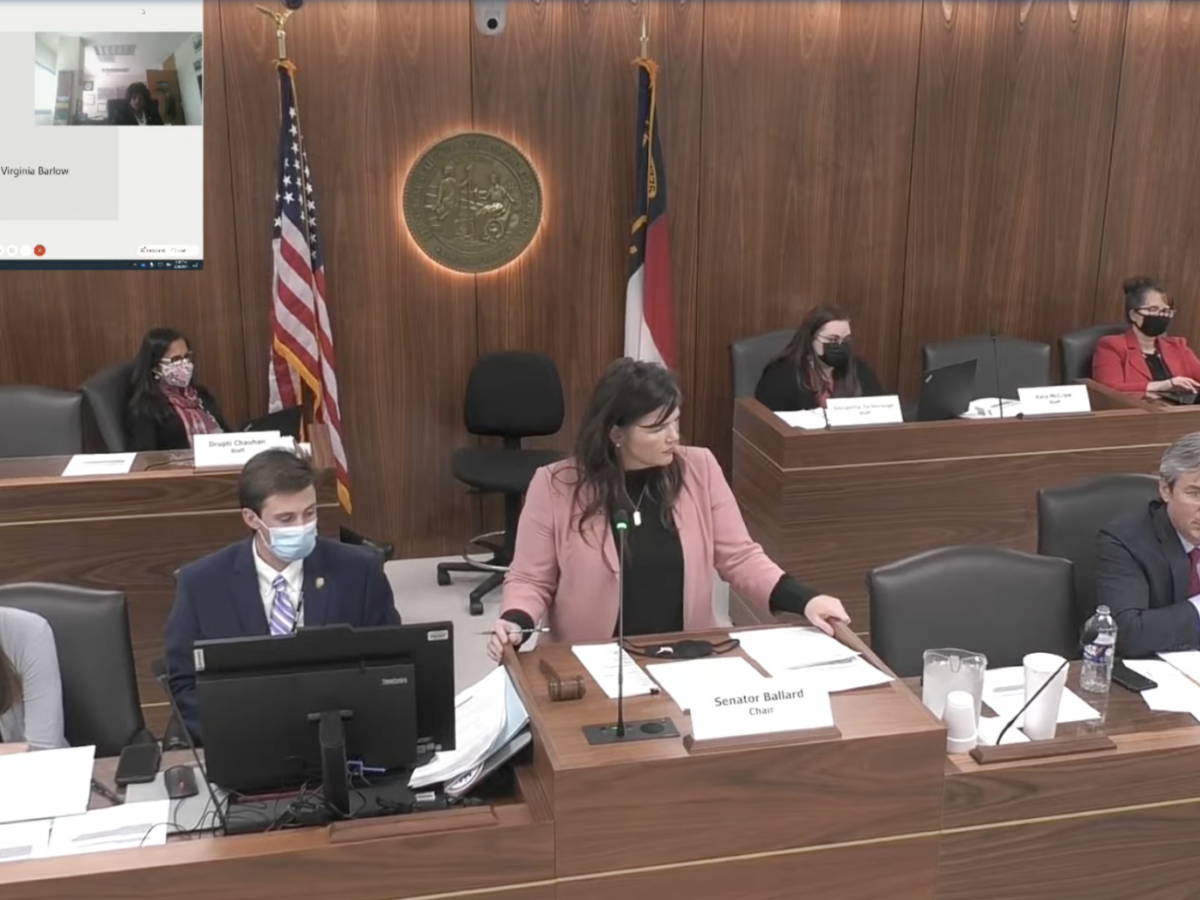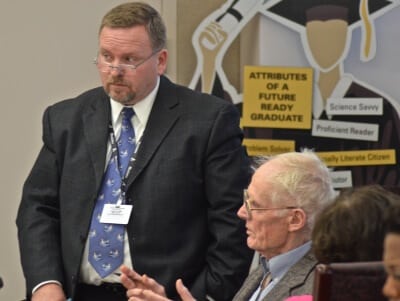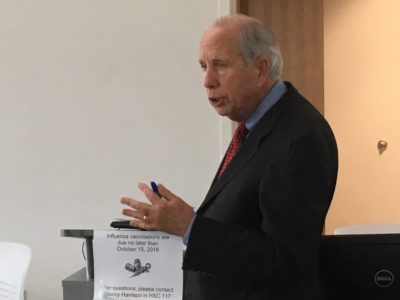
Update 4:54 p.m., March 31, 2021: The bill passed the Senate 48-0. It goes now to the House.
Senate leaders introduced a bill on Monday that would amend Read to Achieve, requiring the training of pre-K and elementary school teachers in the science of reading and directing the State Board of Education to develop new literacy instruction standards. On March 30, that bill received a favorable vote in a Senate education committee.
“We want the best policies that put North Carolina students in a position to succeed,” said Senate President Pro Tem Phil Berger, R-Rockingham, during the committee today. “That is our first and only goal, and this legislation will help us get there.”
Senate education and education appropriation committee co-chairs Deanna Ballard, R-Watauga, and Michael Lee, R-New Hanover, are primary sponsors of the bill along with Berger. All three held a press conference along with State Superintendent of Public Instruction Catherine Truitt on Monday to announce the legislation.
Here’s what’s in the bill
The bill would:
- Require educators working with children in NC Pre-K and K-5 students to complete science of reading training funded by federal COVID-19 pandemic relief funds. The contracted vendor for these funds is Voyager Sopris Learning, which owns the LETRS (Language Essentials for Teachers of Reading and Spelling) training program.
- Have educator preparation programs (EPPs) provide coursework in the science of reading for all elementary education candidates. EPPs must also provide training to all elementary and special education general curriculum candidates in early literacy intervention strategies and practices aligned with the science of reading.
- Add an Early Literacy Program at DPI intended to build early literacy skills utilizing scientific reading research. It also mandates assessing each child at the end of NC Pre-K for readiness and providing the results to that child’s kindergarten teacher.
- Introduce individualized reading plans (IRPs) for every student. For students demonstrating deficiencies in reading development, this document would outline those specific deficiencies and propose literacy interventions.
- Make it so that both reading camp instruction and all literacy interventions be grounded in the science of reading (the Read to Achieve law already provided for reading camps). The bill also requires the State Board and DPI to develop reading camp and literacy intervention standards. Reading camps would have to be provided for eligible students in the second and third grade. It would be an option for districts to provide in the first grade.
- Select teachers for reading camps, as well as teachers for students who were retained at the end of third grade, based on “demonstrated student outcomes in reading proficiency.” Teachers would be compensated for teaching at reading camps, and teachers would be eligible for bonuses based on reading proficiency outcomes.
- Direct the State Board of Education to develop literacy instruction standards, incorporating only “effective literacy instruction methods aligned with the Science of Reading into the standards developed.”
- Require that DPI develop a Digital Children’s Reading Initiative by January 15, 2022. It would curate third-party resources and provide selected links to “thoroughly vetted, high-quality” resources. These links would be categorized by skill and grade level so that parents or guardians can identify which resources to access for their students. The resources would include home activities, printables, and games that address phonemic awareness, phonics, vocabulary, fluency, comprehension, and oral language skills.
What’s this all about?
First, this is not just about phonics. Phonics is a piece of it, but there is much, much more.
Second, the language in this bill makes notable departures from both the Read to Achieve law and the most recent proposal to amend Read to Achieve in 2019.
In 2018, the Friday Institute noted in its study of Read to Achieve that the law was “essentially 115 different pilot programs operating under a few common parameters.” This bill proposes a specific approach to reading instruction, requires the creation of state standards aligned with this approach, and mandates the approach be used in the state’s public schools.
The most obvious difference between this bill and any prior proposed or enacted law is this bill’s consistent mandate that reading instruction be aligned with and grounded in the science of reading, which is a vast, interdisciplinary body of scientifically-based research about reading and issues related to reading and writing.
The body of research called the science of reading tells (1) how the brain learns to read, and (2) some best practices on effective reading instruction.
The first bucket includes things like awareness of letter-sound correspondence, phonemic awareness, and phonics, which give children tools to decode words and which helps kids build vocabulary, fluency, and language comprehension.
Sign up for the EdDaily to start each weekday with the top education news.
In the second bucket, there is a lot of research that says instruction should be systematic (occur in a logical sequence), explicit (deliberate), and cumulative (each concept building on the next).
This EdNC article from December 2019 talks about two approaches to reading instruction, the science of reading and whole language (the latter of which also exists in curricula which marketed itself as balanced literacy).
This EdNC article from March 2020 delves into one reason this isn’t just about phonics.
This EdNC article from February 2021 explores why it is important teachers learn about the scientific reading research while they are in educator preparation programs, rather than waiting until they are already classroom educators.
This EdNC video from February 2021 gives a brief introduction into the science of reading.
So what happened in the Senate education committee?
After presenting the bill, Berger was asked a series of questions from senators on the committee, but most expressed positive feelings for legislation that addresses literacy.
Sen. Gladys Robinson, D-Guilford, said it’s important that the state do something about students being unable to read.
“It’s so critical, especially now, that children get every extra opportunity to continue their education,” she said, adding that it’s particularly important for those who were “left behind” during the COVID-19 pandemic to get additional support. “The ability to read is the background, the foundation of everything.”
Sen. Jay Chaudhuri, D-Wake, asked Berger why the state should be “pushing the science [of] reading” through this bill.
Berger talked about a long-standing debate between proponents of the science of reading and advocates for other literacy teaching methods, saying that the scientific research-based approach has shown the most success. He said one of the reasons the bill is so important is that it requires training in the science of reading for teacher candidates at state educator preparation programs. He said that for years those programs have been using a different method of teaching reading that isn’t as effective.
“As research has moved forward, it’s pretty clear that success for students, particularly those students who are the most challenged … is enhanced with the programs similar to this,” he said.
Sen. Don Davis, D-Pitt, said he has reviewed the literature on the science of reading and concurs that it appears to be the best option. But he said that not everyone agrees.
“There are still those who have been critics,” he said.
He asked Berger if there would still be the option for teachers to use other types of reading strategies.
Berger said approaches taken would have to align with the science of reading. He said that too many students are still falling behind on reading in the state.
“We’ve got to do something different in order to move the needle,” Berger said.
He said, however, that if in a few years the new efforts weren’t showing benefits, the state would have to revisit its strategy.
House Speaker Tim Moore, R-Cleveland, speaking on a different bill during the committee, also voiced his support for the bill, saying he thought it would get a favorable hearing when it made its way to the House.
In the press conference Monday, Berger said he expected the legislation to make it all the way through the Senate by the end of the week. It goes next to the Senate rules committee.
What about summer school?
One other bill was heard in the Senate education committee on March 30. A bill that already passed the House would require districts around the state to offer a summer learning program for at-risk students.
Under the legislation, each district in the state must offer a summer program that lasts at least 150 hours or 30 days to K-12 students to battle learning loss from the COVID-19 pandemic. The priority is for students who are considered at-risk, but other students can participate if space is available. The program is voluntary for families and only applies to traditional public schools.
The Senate education committee only discussed the bill today. It will go back in front of the committee for a vote tomorrow.
Recommended reading




